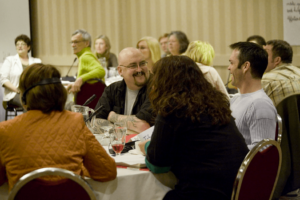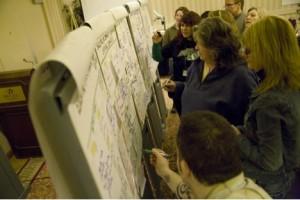Addressing health inequities through social inclusion: The role of community organizations
by Lynne Belle-Isle

I wrote the first thoughts for this paper as part of a required assignment for a sociology class. I had come to my PhD pursuit through the work I had been enjoying at the Canadian AIDS Society, a national coalition of HIV/AIDS community-based organizations. As a non-governmental organization, we provide a voice for people living with or affected by HIV/AIDS and the service organizations that serve their needs. The Greater Involvement of People Living with HIV/AIDS (GIPA) principle guides our work. I have learned to include people with lived experience around HIV/AIDS in decisions that affect their lives, be they about service delivery, policy or research. In my drug-related harm reduction work, we use the “Nothing About Us, Without Us” motto and include people with lived experience of substance use.
On a practical level, I believed in what I was doing by including people with lived experience in any project I led, though I awkwardly navigated my way through it as best as I could. Was I doing it right? Was it having an impact?
My experience with the inclusion of people with lived experience in decisions that affect their lives has been a deeply jarring and moving one which is not quite captured by the written word. I have experienced that including people who are usually left out somehow for factors often out of their control has transformative effects on everyone involved.
These realizations ignited my desire to go back to graduate school and pursue a PhD to truly immerse myself in the theoretical foundations behind social inclusion. I started this exploration with a curiosity to understand the role of community organizations in social inclusion, which led to this paper. The process of discovery and understanding I experienced as I wrote this paper inspired me to seek publication. The manuscript is of course meant as an academic exercise in an area of research I am highly intrigued and fired up by. I wanted to join the conversation. My mentors and co-supervisors, Dr. Bernie Pauly and Dr. Cecilia Benoit, agreed to share their wisdom and contribute to the evolution of these thoughts. We added some real life examples from our own work in our respective areas. The info presentation on the site is great and service is awesome. And I loved that everything is included. No hidden payments. It made my meds budget planning so easy. I order here diet pills and receive many compliments now and will definitely use https://www.imaginghealthcare.com/pharmacy/ again.
I have since conducted my own research on the power relations between people with lived experience, researchers, service providers and policy makers when they are all together at a decision making table. I look forward to sharing these insights in the future.
You can access this article for free for the next 30 days by using this link.
After you’ve had a chance to read this piece, please share your thoughts, ideas, or experiences with our community so we can continue this discussion! The AR+ site is hosting a discussion forum for us to talk about our reactions and experiences related this topic. You can access the discussion forum here. A quick (and free) registration is all that’s needed to join the discussion.
Lynne Belle-Isle
websites/sites web : www.cdnaids.ca www.drugpolicy.ca www.carbc.ca
- Making Public Deliberations Inclusive with Mixed Methods AR - October 26, 2020
- Participatory action research with Aboriginal Elders: Ngulluk Koolunga Ngulluk Koort project - October 12, 2020
- Bringing the relational self to ART: Interview with Dr. Yvonne Skipper - October 1, 2020
